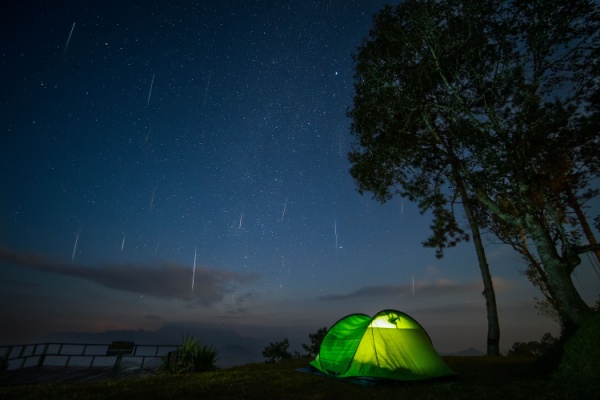One of the best meteor showers of the year is about to peak, sparking shooting stars into the chilly December sky. It’s considered one of the best meteor showers of the year because the nights are longer and the meteors are bright and plentiful.
As AccuWeather reports, the Geminid meteor shower peaks on the night of Saturday, December 13, into the early hours of Sunday, December 14. Skygazers could see up to 120 meteors per hour under dark skies during the peak Saturday night into Sunday’s predawn hours, according to NASA.
While the Geminid meteor shower is most prominently seen from the Northern Hemisphere, it is also observable from the Southern Hemisphere. Meteor showers derive their names from the constellation where their meteors seem to originate, with the upcoming event linked to Gemini. Most meteor showers come from the leftovers of comets, but the Geminids originate from the sun-orbiting asteroid 3200 Phaethon.
Gemini is relatively simple to identify in the night sky; it lies to the northeast of Orion and between the constellations Taurus and Cancer. The constellation is distinguished by its two brightest stars, Castor and Pollux, which symbolize the heads of the Gemini twins.
How to See the Shooting Stars
One of the coolest things about stargazing the Geminid meteors is that you don’t have to pinpoint the constellation to see them. The meteors will be visible throughout the entire night sky with the first shooting stars appearing not long after nightfall.
December has the longest nights of the entire year, providing more time for stargazing. However, it also brings an uptick in storms and clouds, which can make it challenging to view some of the upcoming celestial sights.
As PBS reports, to best enjoy the Geminid show, bundle up and venture away from city lights, which can drown out fireballs. The meteor shower will appear over the whole sky, so look to the darkest part or search for the Gemini constellation for which the shower is named. Lie in a sleeping bag or lean back in a lawn chair and wait 15 to 20 minutes for your eyes to get used to the darkness. That’s when the meteors will appear as tiny glows streaking across the sky.
“The other stars are going to be all stationary, so you’ll see this moving across the sky and it’ll leave a little tail behind it,” said Bethany Cobb Kung, an astronomer with George Washington University. Stay outside and take in the show for as long as the weather allows. Avoid bright lights from cellphones, which can make it harder for your eyes to adjust to nighttime darkness.
If you just can’t get enough of meteor showers, there is still one final event of the year following the Geminids. On the night of Dec. 21 into the morning of Dec. 22, the Ursids will peak. However, it will not be as impressive of a show compared to the Gemninids, as the late-December event only brings around 10 meteors per hour.
—
Photo Credit: Take Photo / Shutterstock.com
